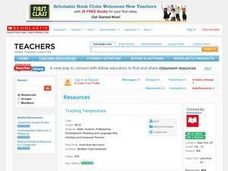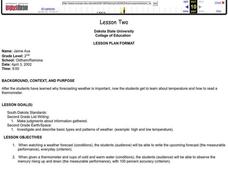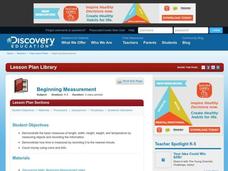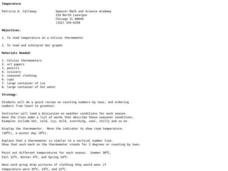American Chemical Society
The Ups and Downs of Thermometers
What has a thermometer earned that your pupils haven't? A degree! After reviewing the previous lessons about molecules and degrees, scholars observe how thermometers work before building their own. The module includes a activity sheet.
Mathed Up!
Reading Scales
After watching a video on how to read different types of scales, young mathematicians complete eight problems involving scales. From thermometers to number lines to rulers and clock, class members identify various numbers on scales.
Curated OER
Tracking Temperature
Students explore how to read a thermometer and what the instrument does. They practice measuring hot and cold objects and discuss changes in the weather based on temperature.
Curated OER
Measuring Liquid Volume & Reading Thermometers
In this liquid volume worksheet, students first practice measuring liquid volume by determining what volume is indicated on each of the graduated cylinders in milliliters for the first nine problems. Then they determine the temperature...
Curated OER
Galileo's Thermometer: Measuring the Density of Various Unknown Liquids
Sprouting scientists explore the concept of density by making mass and volume measurements for five different liquids. From these measurements, they calculate densities. They apply their learning to explain Galileo's thermometer works...
Curated OER
Reading Thermometers
In this reading thermometers worksheet, students read data on given thermometers. They determine the given temperature. This two-page worksheet contains nine problems.
K12 Reader
Measuring Temperature
Fahrenheit? Celsius? What's the difference, and where did these two temperature scales originate? Your pupils will learn all about these topics by reading the passage included here. After reading, individuals respond to five questions...
K12 Reader
Meteorologists
Meteorologists and the tools they use are the subject of a reading comprehension instructional activity that asks kids to read the attached article and respond to a series of comprehension questions.
American Chemical Society
Keeping Warm in the Cold
Bundle up to stay warm! A fun-filled investigation opens with a group discussion about heat loss and using materials to prevent it. Young scientists then view an animation about thermometers and the Celsius scale and practice reading...
K12 Reader
Galileo and His Telescope
Learn about Galileo Galilei's contribution to modern science with a reading passage that focuses on reading comprehension. After kids read several paragraphs about his life, they answer five questions about the information they have just...
Curated OER
Heat Transfer
Answer short answers and fill-in-the-blank questions after reading a briefing of how heat energy is transferred between objects. This straightforward instructional activity can be useful as homework the evening before you do...
Kenan Fellows
Reading Airline Maintenance Graphs
Airline mechanics must be precise, or the consequences could be deadly. Their target ranges alter with changes in temperature and pressure. When preparing an airplane for flight, you must read a maintenance graph. The second lesson of...
Curated OER
How to Read a Thermometer
Students' temperature is measured using an instrument called a thermometer.
Curated OER
Using a Thermometer
First graders use their senses to formulate questions and make predictions to determine what is in the "Wonder Bag". They hold pieces of ice and examine while listing descriptors on a chart and then take their own temperature using an...
Curated OER
How Does a Thermometer Work?
Students explore how a thermometer works. In this temperature instructional activity, students use a glass bottle, a straw, and food coloring to construct a homemade thermometer. Students record observations.
Curated OER
Lesson Two
Second graders, after assessing why forecasting weather is important, study about temperature and how to read a thermometer. They experiment being able to observe the mercury rising up and down when given a thermometer and cups of cold...
Curated OER
Discovering Math: Beginning Measurement
Young mathematicians are shown a ruler, yardstick, tape measure and scale. They practice measuring length, width, height, and weight. They are then shown a thermometer, and discuss what a thermometer is used for. Everyone is shown how to...
Curated OER
Weather Instruments
Middle school meteorologists get acquainted with basic weather instruments: the thermometer, barometer, psychrometer, and anemometer. For each, the question is asked, "Do you think you can make a _______________?" At these points, you...
Curated OER
Hickory Dickory Doc Tell Time
Learners discover time keeping by reading clocks. In this time-telling instructional activity, students read the story Hickory Dickory Dock, and discuss the measurements of time we use. Learners complete worksheets in which they...
02 x 02 Worksheets
Measuring Length
Your young forensic scientists add to and strengthen their measurement and conversion skills with these seven well-scaffold worksheets. Metric conversions, measuring length, area, and volume, reading thermometers, graduated cylinders,...
Curated OER
Temperature
Students explore the concept of temperature. In this temperature lesson, students read thermometers in degrees Celsius. Students discuss the temperature of the seasons and what clothing they might wear given a certain temperature....
K12 Reader
Many Ways to Measure
Measurement tools, yardsticks, scales, and thermometers, are the subject of a reading comprehension worksheet that asks kids to answer a series of questions based on the provided article.
K12 Reader
What’s the Forecast?
A reading comprehension passage is illustrative for both language arts and earth science skills. Using context clues, learners find out how to predict the weather using various tools. They then answer five reading questions about what...
Curated OER
Weather Lesson
Learners discuss the weather conditions. They read thermometer, rain gauge, barometer, and wind direction and speed. They record observations of weather conditions and enter information into data base on the computer.

























